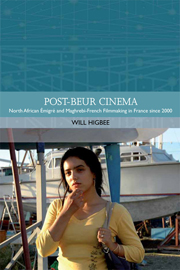Book contents
- Frontmatter
- Contents
- Acknowledgements
- List of Illustrations
- Traditions in World Cinema
- 1 Introduction: From Immigrant Cinema to National Cinema
- 2 The (Maghrebi-)French Connection: Diaspora goes Mainstream
- 3 Colonial Fracture and the Counter-Heritage Film
- 4 Of Spaces and Difference in the Films of Abdellatif Kechiche
- 5 Home, Displacement and the Myth of Return: Journey Narratives in the 2000s
- 6 Screening Islam: cinematic Representations of the Muslim Community in France in the 2000s
- 7 Conclusion: Post-Beur Cinema
- Bibliography
- Index
1 - Introduction: From Immigrant Cinema to National Cinema
Published online by Cambridge University Press: 05 October 2013
- Frontmatter
- Contents
- Acknowledgements
- List of Illustrations
- Traditions in World Cinema
- 1 Introduction: From Immigrant Cinema to National Cinema
- 2 The (Maghrebi-)French Connection: Diaspora goes Mainstream
- 3 Colonial Fracture and the Counter-Heritage Film
- 4 Of Spaces and Difference in the Films of Abdellatif Kechiche
- 5 Home, Displacement and the Myth of Return: Journey Narratives in the 2000s
- 6 Screening Islam: cinematic Representations of the Muslim Community in France in the 2000s
- 7 Conclusion: Post-Beur Cinema
- Bibliography
- Index
Summary
In September 2010, Maghrebi-French filmmaker Rachid Bouchareb's seventh feature film, Hors-la-loi, a gangster film set against the backdrop of the Algerian war for independence, was released across cinemas in France. Made for a budget of €20m, released on more than 400 prints and starring Jamel Debbouze – a French-born actor of Moroccan immigrant parents and one of French cinema's biggest stars – Hors-la-loi enjoyed the kind of distribution and marketing conditions reserved for only the most high-profile French mainstream productions. The film aimed to capitalise on the success of Bouchareb's Second World War epic, Indigènes (2006), which attracted over three million spectators in France and received an Academy Award nomination for best foreign film (admittedly as an Algerian rather than French film). If Indigènes' message to its French audience was simultaneously confrontational and conciliatory, holding successive French governments to account for freezing the pensions of North African colonial soldiers at the same time as it argued for the rightful place of the French-born descendants of these colonial veterans in France, Hors-la-loi proved far more controversial. At the film's premier in Cannes in May 2010, a group of protestors including veterans of the Algerian war, supporters of the far-right and harkis (Algerians who fought for the French in the war for independence) gathered on the Croisette to oppose what they saw as Hors-la-loi's historical distortion of colonial history.
- Type
- Chapter
- Information
- Post-beur CinemaNorth African Émigré and Maghrebi-French Filmmaking in France since 2000, pp. 1 - 25Publisher: Edinburgh University PressPrint publication year: 2013



